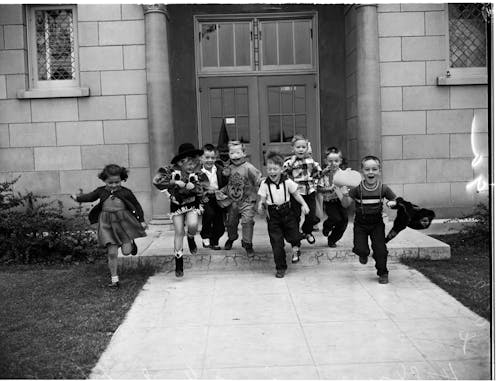How was Halloween invented? Once a Celtic pagan tradition, the holiday has evolved to let kids and adults try on new identities
- Written by Linus Owens, Associate Professor of Sociology, Middlebury

When Catholics arrived in Ireland around A.D. 300, they opened another door between worlds, unleashing considerable conflict. They sought to convert the Celts by changing their pagan rituals into Christian holidays. They rechristened Nov. 1 “All Saints Day,” which today remains a celebration of Catholic saints.
But the locals held on to their old beliefs. They believed the dead still wandered the Earth. So the living still dressed in costumes. This activity still took place the night before. It just had a new name to fit the Catholic calendar, “All Hallows Eve,” which is where we got the name Halloween[9].
Irish immigrants brought Halloween to America in the 1800s[10] while escaping the Great Potato Famine. At first, Irish Halloween celebrations were an oddity, viewed suspiciously by other Americans. As such, Halloween wasn’t celebrated much in America at the time.
As the Irish integrated into American society, Halloween was reinvented again, this time as an all-American celebration. It became a holiday primarily for kids. Its religious overtones faded, with supernatural saints and sinners being replaced by generic ghosts and goblins. Carved turnips gave way to the pumpkins[11] now emblematic of the holiday. Though trick-or-treating resembles ancient traditions like guising, where costumed children went door to door for gifts, it’s actually an American invention[12], created to entice kids away from rowdy holiday pranks toward more wholesome activities.
Halloween has become a tradition many new immigrants adopt along their journey toward American-ness and is increasingly being exported around the world[13], with locals reinventing it in new ways to adapt it to their own culture.
What’s so special about Halloween is that it turns the world upside down. The dead walk the Earth. Rules are meant to be broken. And kids exercise a lot of power. They decide what costume to wear. They make demands on others by asking for candy. “Trick or treat” is their battle cry. They do things they’d never get away with any other time, but on Halloween, they get to act like adults, trying it on to see how it fits.
Because Halloween allows kids more independence, it’s possible to mark significant life stages through holiday firsts. First Halloween. First Halloween without a parent. First Halloween that’s no longer cool. First Halloween as a parent.
Growing up used to mean growing out of Halloween. But today, young adults[15] seem even more committed to Halloween than kids.
What changed: adults or Halloween? Both.
Caught between childhood and adulthood, today’s young adults find Halloween a perfect match to their struggles to find themselves and make their way in the world. Their participation has reinvented Halloween again, now bigger, more elaborate and more expensive[16]. Yet in becoming an adult celebration[17], it comes full circle to return to its roots as a holiday celebrated mainly by adults.
Halloween is a living tradition. You wear a costume every year, but you’d never wear the same one. You’ve changed since last year, and your costume reflects that. Halloween is no different. Each year, it’s the same celebration, but it’s also something totally new. In what ways are you already reinventing the Halloween of the future today?
Hello, curious kids! Do you have a question you’d like an expert to answer? Ask an adult to send your question to CuriousKidsUS@theconversation.com[18]. Please tell us your name, age and the city where you live.
And since curiosity has no age limit – adults, let us know what you’re wondering, too. We won’t be able to answer every question, but we will do our best.
References
- ^ Curious Kids (theconversation.com)
- ^ curiouskidsus@theconversation.com (theconversation.com)
- ^ a Celtic pagan ceremony (press.uchicago.edu)
- ^ Samhain (www.loc.gov)
- ^ on their way to the underworld (global.oup.com)
- ^ Although focused on the dead (theconversation.com)
- ^ for the living (utpress.org)
- ^ Erik Freeland/Corbis Historical via Getty Images (www.gettyimages.com)
- ^ where we got the name Halloween (www.loc.gov)
- ^ brought Halloween to America in the 1800s (www.irishpost.com)
- ^ pumpkins (www.merriam-webster.com)
- ^ it’s actually an American invention (www.bakersfield.com)
- ^ being exported around the world (www.cambridgescholars.com)
- ^ Trolley Dodger/Corbis Historical via Getty Images (www.gettyimages.com)
- ^ young adults (www.usatoday.com)
- ^ more expensive (www.newsweek.com)
- ^ becoming an adult celebration (theconversation.com)
- ^ CuriousKidsUS@theconversation.com (theconversation.com)
Authors: Linus Owens, Associate Professor of Sociology, Middlebury

